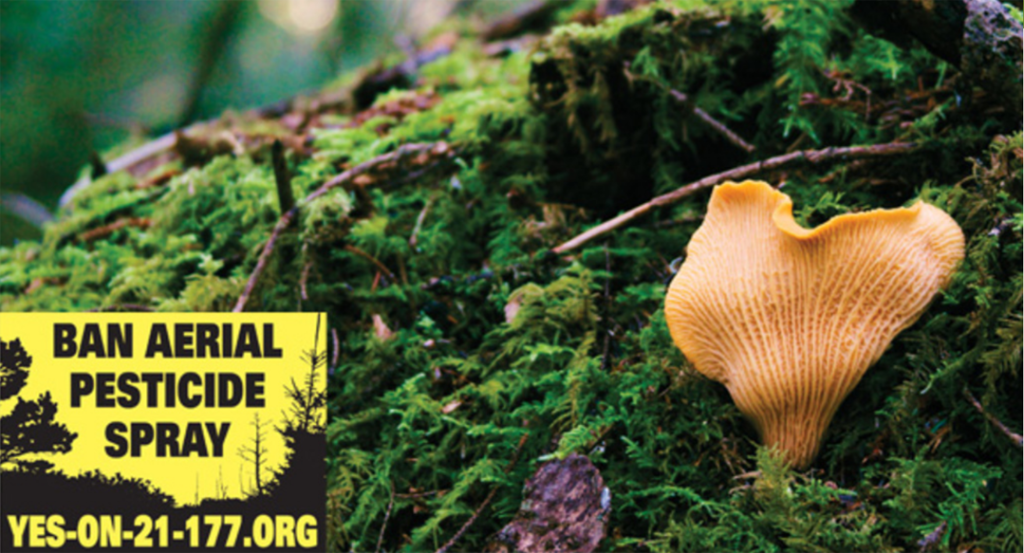 Lincoln County Bans Aerial Pesticide Spraying
Lincoln County Bans Aerial Pesticide Spraying
Measure 21-177 increases its lead to 61 votes, winning a highly contested election.
Newport, Oregon – A majority of voters who returned to sign unsigned ballots approved Measure 21-177, bringing the total vote to 6994 for the ban versus 6933 against it, making the ban on aerial pesticide spraying in Lincoln County a reality. Thanks to the many people who volunteered and campaigned so valiantly, the vast amounts spent by corporate opponents failed to convince voters that profits are more important than health, safety, and the right to informed consent.
By this victory, Lincoln County is the first county in the United States to ban aerial spraying of pesticides by the vote of the people. This is not the first time Lincoln County has spoken truth to power and won.
“Back in 1976, folks here put Lincoln County on the map by winning a huge landmark case against the United States government, stopping federal spraying of Agent Orange on our forests and homes and waterways,” said Susan Parker Swift. “Now Lincoln County has done it again. I couldn’t be prouder to share this repeat victory!”
Barbara Davis, co-petitioner of measure 21-177, says our win brought to her mind the following quote by Margaret Mead:
“Never doubt that a small group of thoughtful committed citizens can change the world; indeed, it’s the only thing that ever has.”
This election was the first major hurdle Measure 21-177 had to overcome to become a reality. Implementation of the measure, and the obstacles to it that opponents will raise, among them superior “rights” to override the rights of the people, including the people’s right to vote and their constitutional right to safety, are next. Citizens for a Healthy County will continue to meet those challenges, and welcomes all who are willing to join us in the effort.
-Lincoln County Community Rights
To learn more about the ordinance and the campaign.
Facebook page or Lincoln County Community Rights.
You Tube

Siletz River Takes Legal Action to Defend Its Rights
July 24th, 2017
FOR IMMEDIATE RELEASE
CONTACT
| Maria Sause
mkrausster@gmailcom 541 574 2961; cell 541 961 6385 |
Rio Davidson
riodavidson@gmail.com cell 541 961 5606 |
Newport, Oregon: This afternoon the Siletz River Ecosystem filed a motion to intervene in the lawsuit Rex Capri and Wakefield Farms, LLC v. Dana W. Jenkins and Lincoln County, and Lincoln County Community Rights. This is the third ecosystem in the United States to take legal action to protect its rights, secured in this case by Measure 21-177, which was adopted by Lincoln County voters in the May 2017 election.
The two plaintiffs – Rex Capri of Newport and Wakefield Farms of Eddyville – claim that their “right” to spray toxic pesticides aerially is greater than the right of the people of Lincoln County to protect public health, clean water, and the rights of ecosystems and natural communities not to be poisoned from the air.
Lincoln County Community Rights (LCCR) was granted intervention in the case on July 2, 2017, after the county made it clear that their interest lies merely in getting an opinion from the court and not in actively defending the law adopted by voters in May.
“I have lived in Lincoln County for 43 years in a home surrounded by river and forest. I am part of the ecosystems of Lincoln County,” says Carol Van Strum, advocate for the intervention of the Siletz Ecosystem. “The Declaration of Independence itself asserts that the laws of nature pre-empt human law. Like the Lorax, I speak for the rights of waters and forests and wildlife to challenge human violations of natural law.”
For the first time, the Siletz ecosystem and all Lincoln County natural communities and ecosystems have secured the right to be free from toxic trespass from aerially sprayed pesticides, a right that is essential to ecosystems’ on-going health, function and survival. That right is stated in Section 2(a) of Measure 21-177 or the Freedom from Aerially Sprayed Pesticides Ordinance of Lincoln County.
The Siletz watershed has lost 46% of its forest in the last 16 years. Huge clear-cuts resulting from strip logging abound in the area and have all been aerially sprayed with pesticides multiple times. Barren of vegetation, the steep terrain causes mudslides and pesticide run-off into the river and smaller feeder creeks, posing a high risk of contaminating a major source of drinking water for Lincoln County, and additionally destroying crucial habitat for salmon and steelhead.
Over the last year, high courts in New Zealand, India, and Colombia have recognized rights for rivers as a means of creating a higher standard of protection for those ecosystems. In Ecuador, the federal constitution has recognized rights of nature since 2008, and two different legal cases have affirmed that rivers have rights and that human activity violates those rights. Restitution penalties go to restoring the ecosystem.
“Protecting nature’s rights through law came from rural, conservative Pennsylvania”, says Kai Huschke of the Community Environmental Legal Defense Fund, the public interest law firm representing LCCR and the Siletz Ecosystem. “Decades of environmental destruction in Pennsylvania made it a no brainer for folks there to protect what sustains them at the highest level. Today over three dozen communities in the United States, including Lincoln County, have stepped forward to secure nature’s rights.”
Though the lawsuit continues to move forward, there is no indication as to how soon the court will respond to the motion to intervene by the Siletz River Ecosystem.
ABOUT LINCOLN COUNTY COMMUNITY RIGHTS
Lincoln County Community Rights is a public benefit organization that seeks to educate and empower people to exercise their right of local community self-government in matters that pertain to their fundamental rights, their natural environment, their quality of life, their health and their safety. Given the harms that people and ecosystems suffer from the practice of aerial spraying of industrial forest land with pesticides, the group drafted an ordinance to ban aerial pesticide spraying in Lincoln County, Oregon. Measure 21-177 was adopted by voters in May 2017, making Lincoln County the first county in the United States to ban aerial pesticide spraying through the vote of the people.
http://www.lincolncountycommunityrights.org/press-info/

Newport – Lincoln County Community Rights (LCCR) has filed to intervene in a lawsuit seeking to overturn Measure 21-177. The lawsuit was filed by Newport resident Rex Capri and Wakefield Farms, LLC against Lincoln County and Dana Jenkins, in his capacity as County Clerk. Measure 21-177 was voted into law by the people of Lincoln County in the May 16, 2017 election.
Intervention allows Lincoln County Community Rights (LCCR) to join the County as respondents in the suit, allowing the people of Lincoln County to stand up for the peoples’ law. The County has made it known that its interest in the lawsuit is to see what the court decides. Such an approach falls short of actually defending the ordinance approved by the people’s vote. In this lawsuit, LCCR is represented by CELDF attorney Ann Kneeland.
Lincoln County Community Rights (LCCR) is a non-profit group based in Lincoln County and run by local volunteers that seeks to empower people to exercise their right to local community self-governance in matters that pertain to their fundamental rights, their natural environment, quality of life, health and safety. Measure 21-177 campaign was run by Citizens for a Healthy County (CHC), political committee of Lincoln County Community Rights.
The right of local community self-governance gives Lincoln County voters the right to create and pass local laws that protect the health, safety and welfare of the people, their community, and nature. It also empowers them to enact laws that ban corporations from engaging in activities that violate the above rights and obligates County government for enforcement.
Measure 21-177, which is also known as the Freedom from Aerially Sprayed Pesticides Ordinance of Lincoln County, secures the rights of people to be free from toxic trespass, the right to clean air, water, and soil, and the right to enjoy outdoor recreation all free from the harm of aerial sprayed pesticides. In addition, the rights of ecosystems and natural communities in Lincoln County are also protected from aerial spray of pesticides.
It is common in Lincoln County and in other communities in Oregon for the timber industry to administer multiple aerial sprayings in conjunction with the practice of clearcutting and replanting within the industrial forest model.
Contrary to the plaintiffs’ assertions filed in their complaint, LCCR believes that the Freedom from Aerially Sprayed Pesticides Ordinance of Lincoln County has been lawfully and validly adopted by the authority of Lincoln County’s voters. LCCR asserts that this law should be enacted and enforced under the constitutional right of local self-government which takes precedence over state preemption when laws enacted by the latter are less protective of health and safety.
As part of the continuing education around local community self-government, the defense and enforcement of Measure 21-177, and what is involved in the current lawsuit, , LCCR is holding a public Community Rights Action (CRA) meeting every fourth Thursday of the month at the Visual Art Center (unless posted to take place at a different location), from 6:30 to 8:30. These meetings will sometimes include guest speakers and films.
